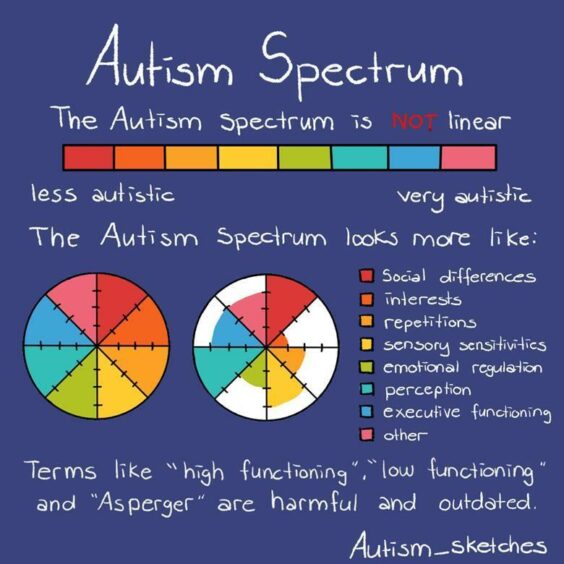Autism is a complex and largely misunderstood condition. We’ve gathered the basic facts of autism in children and answer some of the common questions around the signs and causes of autism.
What is autism?
Autism Spectrum Disorder (ASD) is a complex, lifelong developmental condition.
It’s considered a spectrum disorder because it includes a certain set of behaviours that are different for everyone. The signs of autism generally develop in early childhood and last throughout a person’s life.
ASD includes Asperger’s Syndrome, which is a type of autism with less severe symptoms and no language delay.
The NHS website stresses that autism is not an illness or a disease – it means that your brain simply works differently.
As such, the autistic community has moved away from saying someone “has autism” and prefers to say “s/he is autistic”.
Autism often comes with other conditions, most commonly attention deficit hyperactivity disorder (ADHD), dyslexia, epilepsy, anxiety and depression.
Around 1 in 10 people are autistic – so that means about 56,000 in Scotland.
What are the signs of autism in children?
Autism is best understood as a spectrum of differences. Common signs of autism in children are:
Social communication and interaction
Autistic people can have difficulty ‘reading’ people. For instance, they may struggle to interpret tone of voice, or spot sarcasm. They may take things very literally or have trouble processing information. Many autistic people can seem unemotional, and often like time alone.
Repetitive behaviour
Repetition and routine helps autistic people to make sense of a confusing and chaotic world. They may repeat movements such as hand flapping to help them stay calm.
Sensory challenges
Over-sensitivity and under-sensitivity to light, sound, taste and touch is common in autistic people. For example, the music in restaurants or noise in a shopping centre can be overwhelming and even painful. Even a hug can lead to sensory overload.
Highly focused interests
Autistic adults and children often have great passions, and can immerse themselves in their hobbies with incredible dedication. For example, think of Greta Thunberg’s activism or Elon Musk’s achievements in technology.
Extreme anxiety
Autistic people often feel extreme anxiety, especially in social situations and periods of change. The National Autistic Society says that one third of autistic people have mental health issues, so it’s important they learn their triggers and find ways to cope.
Meltdowns and shutdowns
When they feel overwhelmed, autistic people can react with meltdowns or shutdowns. An autistic child having a meltdown will look like a complete loss of control, often with self-harm or violence.
Many parents find this hard, because strangers can mistake it for a common tantrum. On the other hand, an autistic person may ‘switch off’ when they don’t know how to handle a difficult situation.
What causes autism in children?
Experts say there is no one specific cause of autism. Instead, it is thought to be a mixture of genetic and environmental factors.
According to the website Autism Speaks, these factors increase the risk that a child will develop autism, but they don’t directly cause it. For instance, some gene changes associated with autism are found in people who don’t have the disorder.
Research shows that autism tends to run in families. Parents who carry one or more of the genetic changes can pass this down to their child, even if they’re not autistic themselves. However, the genetic mutation can also happen spontaneously at conception.
Autism Speaks lists some environmental influences that can increase or decrease the risk of autism.
Autism is more likely if either parent is of an advanced age, and in multiple births. Birth complications and pregnancies spaced less than a year apart also increase the risk of autism.
On the other hand, research shows that prenatal vitamins with folic acid can reduce the risk of autism.
It’s important to stress that there’s no known link between autism and vaccinations.
Nor is autism linked to bad behaviour, bad parenting or lifestyle choices.
What do we mean by the autistic ‘spectrum’?
The autistic spectrum is the wide range of differences that an autistic person can experience. Autism is a unique and misunderstood condition that’s as different as each individual.
The autistic community stressed that the spectrum is not linear, from severe to mild. It’s a vast range of features. The drawing below is helpful in understanding this.
Is there a cure for autism?
Autism is a lifelong condition, but autistic groups say it doesn’t need a cure. There is a growing movement to consider autism a developmental difference – not a disability. Many autistic people lead very full and happy lives.
When it comes to managing the condition, experts tend to focus on behavioural, psychological and educational therapy.
This could include speech therapy, occupational therapy and behavioural therapy from a young age – it’s thought that early intervention delivers the best results.
When a child starts school, an educational support plan should be built around their needs. Many autistic children have support from a range of professionals in school, social work and health.
It’s important that families are also supported to understand what triggers their child and how to help them.
How can I get a diagnosis if my child is showing signs of autism?
According to the NHS website, the first step is talking to a medical professional or your child’s school. If your child is under five, you may want to start with their health visitor. Tops from the NHS site:
- write down a list of signs that make you think your child could be autistic
- ask friends, family or teachers if they have noticed anything
- ask for an autism assessment and take notes
- focus only on the question of autism – don’t wander into other topics.
At an autism assessment, the assessor will watch your child interact with others, and ask about any difficulties they seem to have. They may talk to people who know your child well.
What support is there for autistic children and their families?
There’s a large number of organisations available to support autistic families. The National Autistic Society Scotland provides a list of groups who could help.
You can also talk to your local GP or health visitor. Your child has educational rights enshrined in law.
Talk to their school about what support they need. If you run into difficulties, Govan Law Centre offers a free service funded by the Scottish Government to help secure educational support for families.
Useful links:
Scottish Autism
National Autistic Society Scotland
Govan Law Centre




Conversation